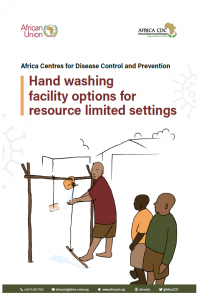There is evidence that hand washing is effective in reducing non-pathogen-specific gastrointestinal and respiratory illnesses in community settings.
- Preventive measures such as good hand and respiratory hygiene and maintaining physical distance are effective for preventing the spread of coronavirus disease 2019 (COVID-19).
- More than 50% of people in many African countries are without access to a basic water supply (3), which is a barrier to hand-washing. In particular, people living in rural settings, densely populated urban areas, and informal settlements such as refugee camps may be more heavily impacted by the lack of access to running water and hand washing stations.
Having access to hand washing stations can improve the habit of correct hand washing by making it more feasible.
This document provides guidance to AU Member States, states/local bodies, and communities on how to construct and maintain non-contact hand washing stations like Tippy Taps and other alternative hand washing stations.
| File | Action |
|---|
| Hand washing facility options for resource limited settings (Portuguese) | Download |
| Hand washing facility options for resource limited settings (Arabic) | Download |
| Hand washing facility options for resource limited settings (English) | Download |
